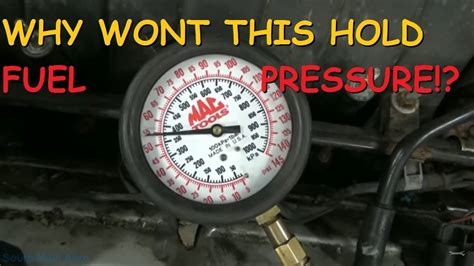How Long Should Fuel Pressure Hold
Ronan Farrow
Apr 06, 2025 · 3 min read

Table of Contents
How Long Should Fuel Pressure Hold? A Comprehensive Guide
Knowing how long your fuel pressure should hold is crucial for maintaining your vehicle's performance and longevity. A failing fuel pressure system can lead to poor engine performance, starting issues, and even engine damage. This guide will delve into the specifics of fuel pressure retention, helping you understand what's normal and what indicates a problem.
Understanding Fuel Pressure and its Importance
Fuel pressure is the force exerted by the fuel pump to deliver gasoline to the engine injectors. This pressure is critical for proper atomization of the fuel, ensuring efficient combustion. Consistent fuel pressure is paramount for optimal engine performance and fuel efficiency.
Factors Affecting Fuel Pressure Retention Time
Several factors influence how long fuel pressure should remain after the engine is turned off:
- Vehicle Year and Make: Different vehicle models have varying fuel system designs, influencing pressure retention times. Older vehicles might show a quicker pressure drop compared to newer ones with more advanced systems.
- Fuel System Components: The condition of your fuel pump, fuel pressure regulator, and fuel injectors directly impacts how well the system holds pressure. Worn or failing components can lead to rapid pressure loss.
- Ambient Temperature: Extreme temperatures, both hot and cold, can affect fuel pressure retention. Higher temperatures can lead to fuel expansion and potential pressure loss, while colder temperatures can thicken the fuel, impacting the system's ability to hold pressure.
- Fuel Quality: Low-quality fuel can contribute to faster pressure drops due to its potential to gum up fuel system components.
How Long is "Normal"? The Pressure Retention Test
There's no single universally applicable answer to how long fuel pressure should hold. The best way to determine if your system is functioning correctly is to perform a fuel pressure retention test. This involves measuring the pressure immediately after turning off the engine and observing how quickly it drops over a set period (typically 10-15 minutes). A significant drop in pressure within this timeframe often suggests a problem.
Interpreting Your Test Results
The specific acceptable pressure drop varies depending on your vehicle's make and model. Your vehicle's repair manual or a qualified mechanic can provide the correct specifications for your vehicle. However, some general guidelines can help you interpret your results:
- Minimal Drop: A slight pressure decrease is expected over time. This is normal due to minor fuel leaks and pressure equalization within the system.
- Significant Drop: A rapid and substantial pressure drop within a short period indicates a potential problem within your fuel system. This often points to issues with the fuel pressure regulator, fuel pump, or other related components.
- No Pressure Hold: If the pressure drops to zero almost immediately after the engine is switched off, it's a strong indicator of a serious fuel system malfunction requiring immediate professional attention.
Troubleshooting Low Fuel Pressure
If your fuel pressure retention test reveals a problem, addressing the issue promptly is crucial. Some common causes of low fuel pressure include:
- Failing Fuel Pump: A worn-out or damaged fuel pump is a common culprit for low fuel pressure. This component is responsible for building and maintaining the pressure needed for proper fuel delivery.
- Leaky Fuel Pressure Regulator: A faulty fuel pressure regulator can allow fuel to leak back into the tank, leading to a drop in system pressure.
- Clogged Fuel Filter: A clogged fuel filter can restrict fuel flow, hindering the system's ability to maintain adequate pressure.
- Fuel Injector Leaks: Leaks in the fuel injectors can cause pressure to drop as fuel escapes.
Remember: Troubleshooting and repairing fuel system problems often require specialized tools and knowledge. If you suspect an issue, it's best to consult a qualified mechanic to diagnose and fix the problem accurately.
Conclusion: Prioritize Proactive Maintenance
Regular vehicle maintenance, including periodic inspections of the fuel system, can help prevent fuel pressure problems. Keeping your fuel filter clean and using high-quality fuel are simple yet effective ways to maintain optimal fuel pressure and extend the life of your vehicle's fuel system. Staying proactive can save you from costly repairs and ensure your vehicle runs smoothly for years to come.
Featured Posts
Also read the following articles
| Article Title | Date |
|---|---|
| How Long Does Neurofeedback Last | Apr 06, 2025 |
| How Long Should You Take Sbi Protect Powder | Apr 06, 2025 |
| How Many Amps Does A 110v Hot Tub Use | Apr 06, 2025 |
| How Long To Decant Bordeaux | Apr 06, 2025 |
| How Long Does Tile Roof Last In Florida | Apr 06, 2025 |
Latest Posts
-
How Many Periods Lacrosse
Apr 07, 2025
-
How Many Perch Can You Keep
Apr 07, 2025
-
How Many Peppermints In A Bag
Apr 07, 2025
-
How Many Peppermints Come In A Bag
Apr 07, 2025
-
How Many People Were At Summer Smash 2024
Apr 07, 2025
Thank you for visiting our website which covers about How Long Should Fuel Pressure Hold . We hope the information provided has been useful to you. Feel free to contact us if you have any questions or need further assistance. See you next time and don't miss to bookmark.
